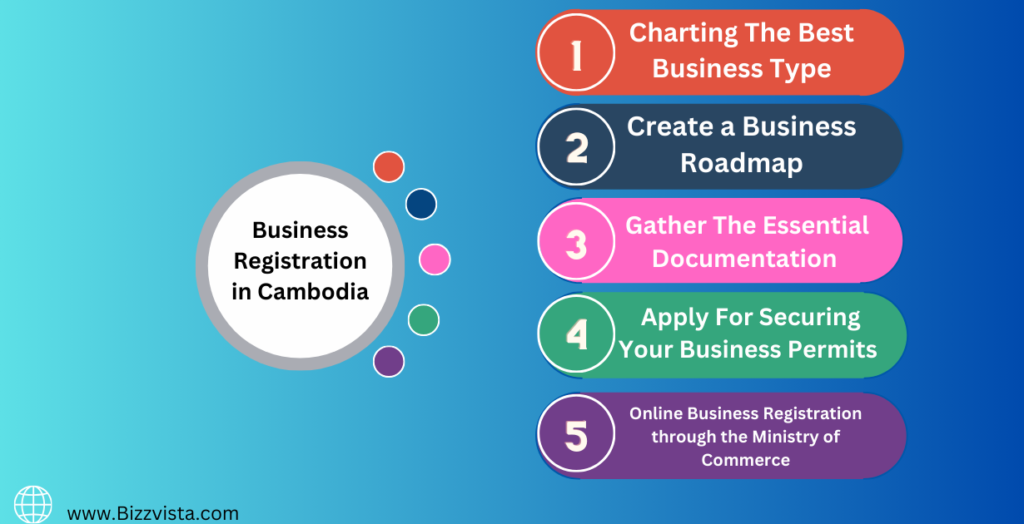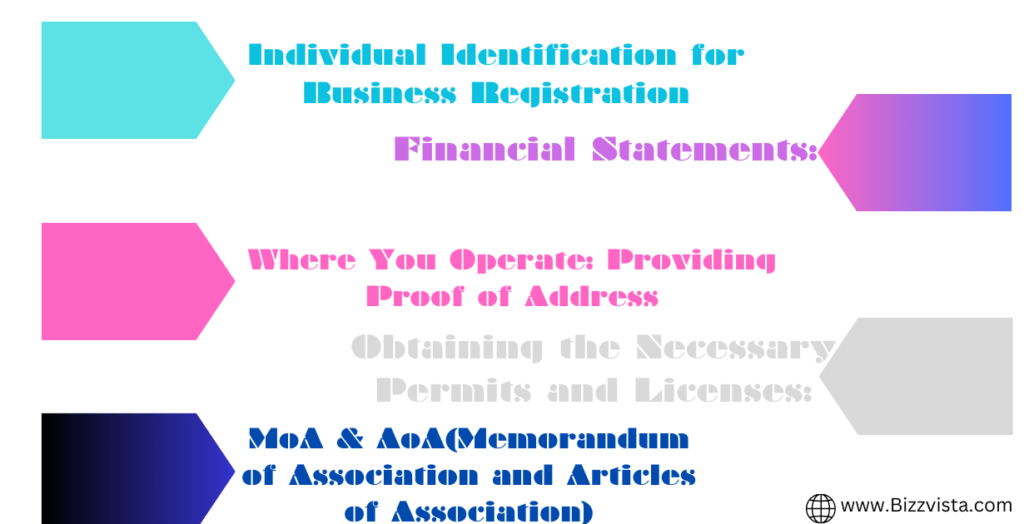Starting a business in Cambodia, as well as in most other countries, is not only about having a great idea and entrepreneurial spirit. It requires a sharp perception of business registration details, which is a process that is vital for laying the foundation for your venture in this dynamic Southeast Asian market. However, the bureaucratic obstacles are not the only factor that you should take into account. The understanding of the importance of the registration forms the basis of your success and the abidance by the local laws in the long run.
Understanding Business Registration in Cambodia:
Definition and Significance:
Entrepreneurs in Cambodia register their businesses as a process that leads to the recognition of their business for legal purposes. This step not only serves an administrative purpose but is also the essence of the compliance with the local laws and regulations, it is the legal framework that defines the operations of the business. It is a seal of approval so the companies can do business under the same rules and regulations.
The Legal and Regulatory Framework
The framework of Cambodia’s business environment entails an in-depth analysis of the most important regulations and the legal side of things. Entrepreneurs are advised to become familiar with the laws of local taxation, labor, and business operations which apply in their area. This information gives them the power to make an informed decision, which in turn ensures that their undertaking is in line with the legal obligations and requirements set in place by the Cambodian authorities.
Business in Cambodia; Selecting the Ideal Structure:

Understanding Available Business Structures: An Overview
Before undergoing business registration, entrepreneurs should properly think about the available business structures in Cambodia. The types of these business entities may be either sole proprietorships, partnerships or limited liability companies. Every structure is unique in its features and aspects such as the liability of a firm, taxation, and the operational flexibility.
Understanding the Ups and Downs of Each Business Structures:
It is significant for entrepreneurs to analyze the strengths and weaknesses of all business structures so as to make a well-informed decision. Sole proprietorships give a simple structure to the business but the owner is legally responsible for all the debts, whereas limited liability companies offer protection from the personal liability, but the owner may have to comply with more complex legal requirements. Knowing these details adds to the entrepreneurs’ understanding of their business goals and risk tolerance in making the right business choice.
Decision-Making Framework: Factors to Consider
The right business structure should be decided only after a thorough evaluation of multiple factors. Entrepreneurs should look into the taxation aspect of each structure, the liability concerns, and the flexibility in operation that each structure offers. However, this decision is not made in the same way; it must be adjusted to the unique needs and interests of the business.
Streamlining Cambodian Startup: A Guide to Registration Documents
Essential Documents You Need
Registering in a company registration process implies a thorough preparation of documents. Entrepreneurs are advised to put together a comprehensive list, which includes their identification documents, business plans, financial statements, and other documents which are mandatory by the government. This list may be viewed as a map, which is indispensable in the process of registration, thus, nothing is left out.
A Guide to Each Document’s Purpose:
The registration process is made up of a number of different documents each of which is dedicated to a specific function. The documents may include: a signature, a business plan, and a statement of financial health. Therefore, it is necessary to know the purpose of each document. A full description of each paperwork will help entrepreneurs understand why they need them, which will, in turn, speed up the registration process.
Essential Tips for Hassle-Free Document Preparation
Getting the required documents can be a tedious affair, so proper planning will make the exercise less stressful. Entrepreneurs should get into this game as early as possible, and they’ll get professional advice if they need it. They should also stay on the top of any regulatory changes. These steps are aimed at ensuring a smooth and accurate document preparation process, eliminating the risks of being delayed in registration.
Prime Location; Cambodia Rising As A Business Powerhouse:
A Glimpse Into Cambodia Business Climate
Cambodia is a country that is on the rise, with an economy that is stable and growing steadily. The nation’s geographical location in the Southeast Asia region makes it a gateway to the emerging markets, which is the main reason why the country is an ideal destination for entrepreneurs looking for new opportunities.
Advantages and Opportunities for Businesses:
The Cambodian business community can benefit from many positive factors, like tax incentives, trained workforce, and a variety of market prospects. Understanding these advantages is a chance for entrepreneurs to capitalize on Cambodia’s advantageous business setting for their ventures.
Establishing Presence: Key Considerations For Entrepreneurs:
Cambodia is a distinctive country compared to other nations and so entrepreneurs who want to set up their businesses in Cambodia should take cultural factors and exhaustive market research into account. Collaboration with local partners and paying attention to the regulatory environment is a crucial factor for the business launching process.
Business Launch in Cambodia: Your Step-by-Step Guide to Registration
Starting the process of company registration in Cambodia requires a strategic and well-considered business plan. For a hassle-free and a well-established business set-up, entrepreneurs should take some steps, each of which have a crucial role in laying the foundation of a legally compliant business entity.

Step 1: Charting The Best Business Type
The initial landmark in this process is choosing the best legal business entity for your business. The Kingdom of Cambodia has numerous possibilities for business, including sole proprietorships, partnerships, and limited liability companies. Every organization has its own features and pros and cons, so it is important to choose the type of business entity that suits your business best.
Understanding how various business structures affect them gives entrepreneurs the tools to make informed choices. However, sole proprietorships are very easy to set up, yet they also involve individual liability. Contrary to that, companies with limited liability offer a degree of protection but are characterized with a complex compliance. Evaluate whether a C-Corporation, S-Corporation, or Limited Liability Company (LLC) will best suit your needs by taking into account your long-term goals, risk tolerance, and operational needs.
Step 2: Create a Business Roadmap
A good business plan is the map that steers your business on the course of the market’s intricacies. The business plan is the vital document not only for the registration but also a guide to your entrepreneurial journey. Write down your business goals, envisage your target audience, examine the competition, and make financial projections. Think of your business plan as a living document that changes with the growth of your venture. Not only does it help you to obtain the required permits and approvals, but it also guides you on what your business direction is and what difficulties your business may encounter.
Step 3: Gather The Essential Documentation
Document preparation is one of the most delicate processes that needs an eye to detail. Prepare a checklist of all the necessary documents, including identification papers, business plans, financial statements together with other papers that would be demanded by the Cambodian authorities. Providing that these documents are correct, up-to-date and consistent with the related regulations.The significance of comprehending the purpose of each document is essential for the registration process to run smoothly. Starting from your ID to your company’s financial health, all of them have their own specific purpose. Ensuring that these documents are well prepared in detail will eliminate the delays and ensure that the business registration process goes smoothly.
Step 4: Apply For Securing Your Business Permits
The regulatory framework for the business in Cambodia is the process of getting the licenses for the certain business activities that your business is involved with. These licenses are different based on the business nature and can be from municipal authorities, environmental permits, or health and safety approvals.
Besides legal compliance, you are also setting an example of your company’s responsible operation. Every permit is a symbol of the adherence to certain rules, which in turn helps to establish the general reputation of your business.
Step 5: Online Business Registration through the Ministry of Commerce
The last step will be the online registration with the Ministry of Commerce which will be the final step in the process. Build upon Cambodia’s digital infrastructure to create the most efficient way to complete this step. The online registration platform will be user-friendly, which will make it so easy for the entrepreneurs to submit their documents and finish the registration process in an efficient way.
Streamline Your Registration: Essential Documents for Your Cambodian Business

Business registration in Cambodia is an adventure which requires a lot of preparation on the part of the entrepreneur by providing the necessary documents. Identifying the particular necessities and details of each application is the key to an efficient and successful registration. Let’s delve into the key documents you’ll need to navigate this regulatory landscape: Let’s delve into the key documents you’ll need to navigate this regulatory landscape:
Individual Identification for Business Registration
In the first place, the list of the documents required includes passports and other identity papers. The following are examples: these include valid passports or national identity cards of the business owner or owners. Making sure the documents are updated and accurately contain the details of the people in the process is a must for a smooth registration.
Where You Operate: Providing Proof of Address
A real tie to a physical location is created by way of a proof of address. This can be in the form of utility bills, lease agreements, and any official document that is evidence of business address. An effective and truthful proof of address contributes to the credibility and transparency of your business registration.
MoA & AoA(Memorandum of Association and Articles of Association)
The building blocks of your business organization start from the Memorandum of Association and Articles of Association documents. These documents will be the basic documents that will highlight the company’s objectives, rules and internal procedures. The memorandum of association, on the other hand, reveals the company’s objectives and authorities, while the articles of association provides the rules and regulations as well as the shareholders’ rights.
Financial Statements:
Producing accurate and updated financial statements is important and necessary to show the financial condition of the business. This part entails balance sheets, income statements, and cash flow statements. By showing financial transparency, not only does the registration process benefit but also builds confidence in investors and stakeholders.
Obtaining the Necessary Permits and Licenses:
Depending on the nature of your business activities, various permits and licenses may be required. These could range from municipal permits to industry-specific licenses. Ensuring that you have obtained all the necessary approvals and permits showcases your commitment to operating within the legal framework.
Other Required Documents:
However, on top of what has already been mentioned concerning the described above key documents, some particular industries or business vessels may require the extra documents to be written. For instance, it could be health and safety certificates, environmental impact studies, among other certificates that must meet the legal requirements of various governments established regulatory bodies. Let’s give an overview of the industry specifications, this will guarantee your ultimate compliance.




